How to Get Rid of Musty Smell in Basement?

If musty odors are creeping into your basement, don’t worry you’re not alone! That damp, funky smell is a common issue in such spaces, but the good news is, there are simple ways to get rid of it for good. With a few easy steps, you can make your basement a fresh, welcoming space again. Whether you’re dealing with moisture buildup or just that typical basement smell, we’ve got you covered with this helpful guide on How to Get Rid of Musty Smell in Basement? Let’s turn that musty basement into a cozy and pleasant part of your home!
Understand this.
Whether your basement is finished or unfinished, it’s a valuable part of your home. But when there’s that unpleasant, musty smell lingering, it can make the space feel less inviting. And let’s be real, nobody wants those odors creeping into the rest of the house! The good news is, you don’t have to live with it. This warm, simple guide on How to Get Rid of Musty Smell in Basement will show you exactly how to tackle that smell in a budget and no budget barrier both, once and for all. Plus, we’ll give you some easy tips to prevent those musty odors from coming back, so your basement stays fresh and welcoming year-round.
Find the Reason First.

The first step in learning How to Get Rid of Musty Smell in Basement spaces is figuring out where those unpleasant odors are coming from. Often, that musty smell is a sign of a deeper issue usually mold or mildew caused by moisture buildup.
Some common spots where moisture tends to gather in the basement include:
– Windows: Wells can sometimes direct water toward the house instead of away from it.
– Exterior doors or entrances like bulkheads.
– Windows or doors from the upper floors.
– Plumbing from bathrooms or kitchens upstairs.
Sometimes, the culprit might even be groundwater, especially if the grading around your home slopes back toward your basement. If you notice puddles at the base of the walls, and there’s no obvious source like a door or window, groundwater could be making its way in.
In finished basements, if you’re sure there aren’t any leaks, the odor might be coming from a dry floor drain or P-trap under a sink. When these drains aren’t used often, the fluid that usually blocks sewer gases can dry up, letting those smells creep in. A simple fix is to pour a few cups of water into the drains now and then.
Lastly, don’t forget that pet odors on furniture or carpets can also contribute to musty smells. If everything is dry and watertight, try cleaning carpets or upholstered furniture with specialized shampoo or using an ozone generator to neutralize lingering odors.
By pinpointing the source, you can easily freshen up your basement and make it a more enjoyable space.
Make the Repairs!
Once you’ve identified the source, the next step in learning How to Get Rid of Musty Smell in Basement spaces is to make necessary repairs. While you might be able to temporarily freshen up the air, the musty odor will keep coming back unless you fix the underlying issues.
Leaky windows and doors will continue to let in water whenever it rains, and cracked or worn-out pipes will keep causing moisture problems until they’re replaced. If your cold water pipes are sweating, a simple fix is to wrap them in pipe insulation to stop condensation.
For bigger issues, like severe leaks in the foundation, it might require more work. Sometimes, this means applying a waterproofing membrane outside the house, or you can coat the inside of your foundation with a waterproofing treatment to stop moisture from seeping in.
If groundwater is the culprit, re-grading the property around your house may help, or you might need to install a French drain to direct water away from your basement. In cases where the basement is particularly damp, adding a trough around the interior that leads to a sump pump can manage groundwater effectively.
Don’t forget to deal with any wet materials inside. Mold can be cleaned off damp drywall, wood, and concrete, but soaked drywall or insulation should be replaced rather than repaired.
For small leaks, you might be able to handle the fixes yourself, but for anything major or if you’re unsure about where the moisture is coming from, it’s a good idea to call in a contractor. Taking care of these repairs will help ensure that musty smells stay gone for good.
Fix Humidity.

After making the necessary repairs, the next crucial step in How to Get Rid of Musty Smell in Basement areas is to dry it out and keep it dry. The simplest and most effective way to do this is by using a dehumidifier. These handy devices pull moisture out of the air, trapping it in a removable tank that you can easily empty. If you prefer a more hands off approach, some models allow you to attach a drain hose, so the water drains directly into a sink or floor drain no need to keep emptying the tank.
To keep your basement feeling comfortable and mold free, aim for a humidity level around 50%. Going higher than 60% can create the perfect environment for mold growth, and nobody wants that! Dehumidifiers are perfect for basement settings, making sure your space stays dry, fresh, and welcoming.
Handle the Smell this Way.
Once you’ve taken care of the moisture, it’s time to tackle that lingering musty smell. The process is easy and can be done with everyday items you probably already have at home. For a simple yet effective solution to How to Get Rid of Musty Smell in Basement, place bowls of baking soda around the space. Baking soda works wonders in absorbing odors, and within a few days, you’ll notice a big difference. You can also try bowls of white vinegar or even clean cat litter both are excellent at neutralizing unpleasant smells. If the mustiness is especially stubborn, products like DampRid, designed specifically for absorbing moisture and odors, can be a great addition.
While these deodorizers do their thing, take the time to give your basement a good cleaning. A mix of equal parts water and white vinegar is affordable and effective. You can spray it on surfaces or mop the floors, focusing on areas that previously had mold.
If you have carpets or upholstered furniture in your basement, they can hold onto smells long after the space is dry. Renting a carpet and furniture steamer can give these pieces a deep clean, helping to fully refresh the room.
With these steps, your basement should smell fresh within a week. Keep an eye out for leaks, ensure P-traps stay full, and maintain the humidity with a dehumidifier. Follow this routine, and your basement will stay odor free for years to come!
Quick Pointers.
Step -1 Fix Plumbing Leaks and Condensation.
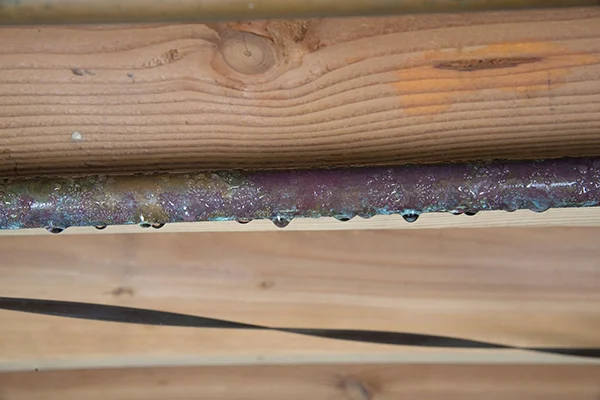
Step- 2 Address the Groundwater.
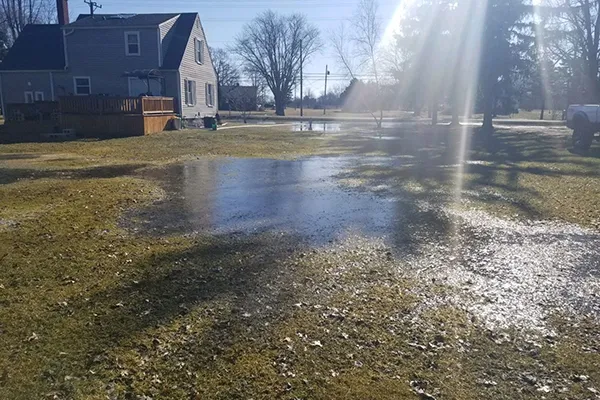
Step – 3 Check and Fix Mold Growth.
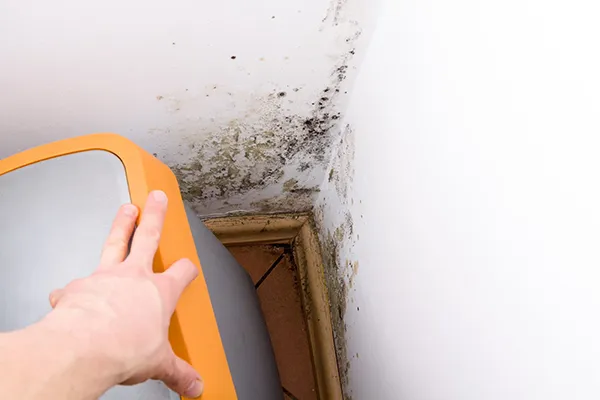
Step 4 – Use a Dehumidifier.

Step 5- Seal the Sump Pump.
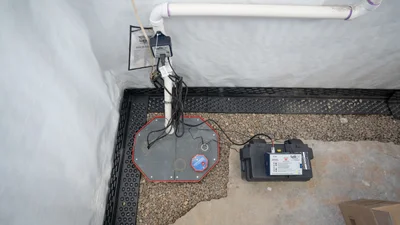
Step 6: Allow Natural Light to Come in.
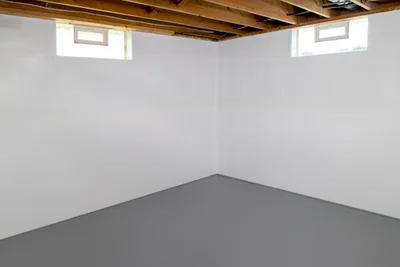
Step 7: Maintain Proper Air Circulation.
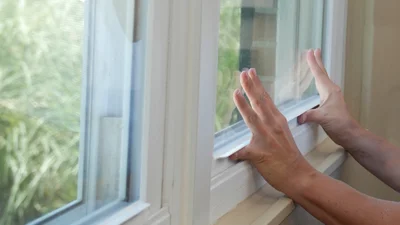
Step 8: Clean Pet Waste.

Should I be Concerned About Health Issues due to the Musty smell in my Basement??
Yes, you should definitely be concerned about that musty smell in your basement it’s a red flag for mold. Mold can pose health risks, especially for those with allergies, asthma, or other respiratory conditions. If you’ve noticed symptoms like a stuffy nose, coughing, or irritated eyes, it could be mold-related. Plus, air from the basement circulates throughout your home, spreading mold spores.
Addressing it quickly is key to maintaining a healthy space. To get rid of musty smells in your basement, tackle mold and moisture issues head-on before they get worse.
Our Conclusion:
A musty smell can turn your basement from a cozy hideaway into an uncomfortable space. Whether it’s an unfinished storage area or a beautifully finished family room, that damp, musty odor is often a sign of something more serious, like mildew or mold. But don’t worry using the tips in this guide on How to Get Rid of Musty Smell in Basement, you’ll not only track down any leaks and eliminate the odors, but also tackle the root cause of moisture to keep that smell from coming back. By staying on top of humidity and moisture control, you can make sure your basement remains fresh, welcoming, and a valuable part of your home.
